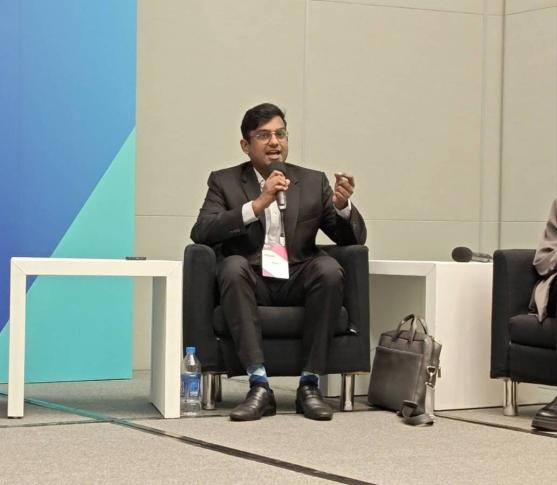
Recently, I had the privilege of attending the RightsCon 2025 in Taipei, Taiwan, where I had the opportunity to engage with what I believe are some of the pressing issues of our time. This was the 13th edition of RightsCon and the first in East Asia, hosted by Access Now.
This year's RightsCon was an incredible confluence of civil society, industry, academia and government entities, working toward the laudable goal of preserving and upholding digital rights in the world. It was marked by a sense of urgency.
In the context of war, conflict, increasing authoritarianism and the erosion of digital rights, I was struck by the necessity and importance of creating connections and bridges amongst stakeholders. The conference presented a unique opportunity to set the agenda straight, to realign and focus our priorities and to reaffirm that we do not operate in silos.
The necessity to engage
From the moment I landed in Taipei, I was filled with a brimming sense of anticipation and momentousness, eager to be a part of something bigger than myself. Interacting with colleagues from across the world, all of whom share similar goals, helped me feel a sense of community that is so easy to lose sight of while climbing our individual Sisyphean hills.
My experience at this event helped me to not only showcase the work my organisation does, but also to imbibe insights and learnings from global stakeholders. What struck me the most was the amount of work being done along similar lines in different jurisdictions. The need to leverage learnings and to share resources was a priority for participants, and their generosity and drive to collaborate uplifted my spirits.
From the regional to the national to the international level, collaboration was the key. As someone who works primarily at the national level in India, it was heartening to find opportunities to share learnings from victories and setbacks to help other organisations facing similar struggles. The insights I gained into my work far outweighs months of research.
The need to set up regional channels for collaboration
One of my major takeaways was the underutilised potential for regional collaboration in South Asia. As countries with shared histories and commonalities, the only bar to collaboration has been political and historic contexts. While that might seem like an insurmountable bar, there still exist avenues where collaboration would be possible. This could take the form of knowledge-sharing exercises in the realms of research, litigation, policy advisories, and engaging with the governments of our respective countries.
The role that India plays in influencing laws amongst its neighbours cannot be understated. The benefit that could accrue here would be Indian civil society organisations sharing their experiences with partners, giving a leg up to any work that happens on similar laws enacted in different jurisdictions. In this capacity, SFLC.in (Software Freedom Law Center) shared its experiences with internet shutdowns and litigations. Since we run the only real-time internet shutdowns tracker in India, we were able to provide particular insight into victories and challenges that occurred in the journey of fighting for better internet access.
I also had the privilege to be invited to speak at a panel discussion, titled "Navigating the Impact of Internet Shutdowns". The session delved into the significant impacts of internet shutdowns in India, Palestine, Bangladesh, the Middle East region and others. I spoke about the sociopolitical factors behind these shutdowns, their consequences on education, healthcare, business and human rights, and how affected communities cope with such disruptions. We discussed successful advocacy strategies, legal interventions, technological solutions and policy recommendations to prevent future shutdowns.
Further, we found common ground to work on litigation, including capacity-building trainings for lawyers which we currently provide through our Digital Defenders Network, a pan-India initiative to protect digital rights.
Capacity building is vital
Putting my lawyer cap on for a second, an issue that crops up frequently is judges’ and lawyers’ lack of technical background while adjudicating and arguing digital rights cases. Similarly, lawmakers and policy makers too need to be sensitised to issues beyond mere economic and regulatory concerns while they draft laws that impact the rights of large chunks of the population. Capacity building for these stakeholders will be a crucial measure to ensure that they are at the very least aware of the contexts in which laws are to be drafted. This will also ensure that resources of civil societies and digital rights lawyers are guided in the right direction. Capacity building is the best way to invest in future victories. At RightsCon, we discussed ways to pool resources and ensure that capacity building does not fall short, especially in the South Asia region.
The urgency of our work
As RightsCon came to a close, we were left with a sense of urgency, but also optimism. By investing in capacity building, fostering collaboration between regional partners and engaging with relevant stakeholders, we can pave the way for a more inclusive digital future.
On my flight back, I was able to take stock of the whirlwind that RightsCon was, and the many ways in which my thinking has expanded. The prevailing global situation notwithstanding, everybody I met helped me understand how important the work we do is. The present might be grim, but with continued and sustained work, the future need not be so.
Nilay Shah is a legal counsel at SFLC.in, and, in this capacity, works on issues pertaining to digital rights. He also works on rights-based litigation before various Indian courts, as well as on issues relating to data protection, and leads projects on platform regulation and software patents. He is a trainer for SFLC.in's digital security training exercises.
The author's participation in this year's RightsCon was supported by the APC Member Engagement and Travel Fund (METF).